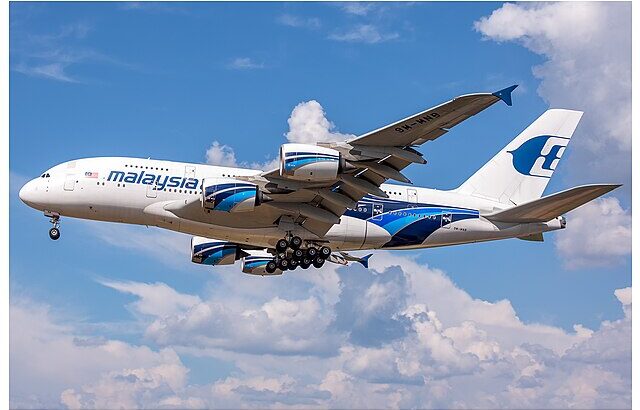As part of its strategic restructuring efforts initiated in 2021, Malaysia Aviation Group (MAG) confirmed placed its entire fleet of Airbus A380 aircraft into long-term storage, signalling a shift towards more fuel-efficient and cost-effective widebody operations.
The decision comes in line with MAG’s broader recovery and sustainability plans following the financial pressures brought on by the COVID-19 pandemic. The group has since opted to phase out its superjumbo fleet, replacing the A380s with Airbus A350-900 aircraft, configured in a 328-seat layout.
MAG’s six Airbus A380s were originally delivered between May 2012 and March 2013. However, amid plummeting international travel demand during the pandemic, the aircraft were grounded and placed in long-term storage between February and April 2020.
Three A380s are registered to Dublin based Airbus Financial Services, a wholly owned subsidiary of Airbus, in the IFSC.
EI-HKA Airbus A380-841 (msn 078) stored Lourdes–Pyrénées Airport ex 9M-MNA.
EI-HKB Airbus A380-841 (msn 081) stored Lourdes–Pyrénées Airport ex 9M-MNB.
EI-HKC Airbus A380-841 (msn 084) stored Lourdes–Pyrénées Airport ex 9M-MNC.
In April 2022 at IBS Virtual Airshow, Malaysia Airlines Group CCO Ahmad Luqman Mohd Azmi stated “[The A380 retirement] was a decision that we made given the cost to the business of the A380. Trying to fill 500 seats compared to a 280 passenger A350 is much easier on the two engine widebody aircraft, like the A330 as well.”
In July 2021, the airline launched a tender for the sale of its six Airbus A380s, however, it did not seem to attract any serious interest.
On 8 April 2025, VAS Aero Services, announced has been selected by Airbus to manage the teardown of and redistribution of used serviceable material (USM) from three Airbus A380 aircraft (involving airframes MSN 61, 66, and 84) through its partnership with Tarmac Aerosave, a leader in aircraft storage, maintenance and recycling based in Lourdes.
With the entry into service of Boeing’s long-awaited 777X delayed until at least 2026, airlines are leaning more heavily on the Airbus A380 to meet long-haul, high-capacity travel demands—a shift that’s putting pressure on aftermarket support for the superjumbo.
Tommy Hughes, CEO of VAS Aero Services, says the delay is intensifying reliance on the A380, particularly among operators seeking to bridge the gap in fleet capacity. “There’s a renewed appreciation for the A380’s capabilities in certain markets, especially as options for large, twin-aisle aircraft remain limited in the near term,”
That resurgence is driving up demand for quality used serviceable material (USM) to support the existing fleet of A380s, of which roughly 175 remain in operation worldwide. With limited teardown activity and fewer available donor aircraft, suppliers are under growing pressure to meet maintenance needs.
Image Credit: Creative Commons – Mhashan
Irish Aviation Research Institute © 26 April 2025 All Rights Reserved
